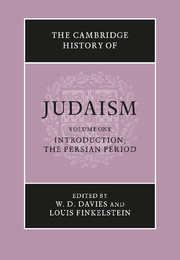Book contents
- Frontmatter
- INTRODUCTION
- THE PERSIAN PERIOD
- 4 The Persian empire and the political and social history of Palestine in the Persian period
- 5 The archeology of Persian palestine
- 6 Hebrew and Aramaic in the Persian period
- 7 The Jewish community in Palestine in the Persian period
- 8 Prophecy and Psalms in the Persian period
- 9 Wisdom literature in the Persian period
- 10 Jewish religious life in the Persian period
- 11 Persian religion in the Achemenid age
- 12 Iranian influence on Judaism: first century B.C.E. to second century C.E.
- 13 The Diaspora
- Bibliographies
- Chronological Table
- Index
- References
10 - Jewish religious life in the Persian period
from THE PERSIAN PERIOD
Published online by Cambridge University Press: 28 March 2008
- Frontmatter
- INTRODUCTION
- THE PERSIAN PERIOD
- 4 The Persian empire and the political and social history of Palestine in the Persian period
- 5 The archeology of Persian palestine
- 6 Hebrew and Aramaic in the Persian period
- 7 The Jewish community in Palestine in the Persian period
- 8 Prophecy and Psalms in the Persian period
- 9 Wisdom literature in the Persian period
- 10 Jewish religious life in the Persian period
- 11 Persian religion in the Achemenid age
- 12 Iranian influence on Judaism: first century B.C.E. to second century C.E.
- 13 The Diaspora
- Bibliographies
- Chronological Table
- Index
- References
Summary
The ‘Persian period’ – roughly, the two centuries from Cyrus ‘capture of Babylon in 539 to Alexander’s capture of Tyre in 332 b.c.e. – presents us with such variety in what may loosely be called ‘Jewish religious life’ that it raises the question, what is meant by ‘Jewish’? The adjective derives from the noun ‘Jews’, Yehudim in Hebrew, Yehudin in Aramaic. For these terms there is on the one hand the territorial definition, ‘residents of Judea’, implied, for example, by the reference to the Persian ‘governor of Judea’ as ‘governor of the Jews’ (Ezra 6: 7, purportedly quoting a letter of Darius I); on the other hand, the ethnic ‘descendants of Judeans’, the members of the Persian garrison in Elephantine, settled there for well over a century, still called themselves Yehudin although they had intermarried with Egyptians and worshipped a number of deities besides Yahweh. A third definition is implied by the uses in Ezra 4: 12; 5: 4–5, which equate ‘the Jews’ with the exiles returned from Babylonia, excluding the population left in Palestine. These Jews worship only ‘the God of heaven and earth’ (that is, Yahweh), and explain their history in terms reminiscent of Deuteronomy (Ezra 5:11). Other documents suggest other definitions – for example, Nehemiah's apology (notably 5: 1, 17) refers to ‘the Jews’ as if they were a privileged class in Jerusalem. If more texts were preserved we should probably have yet more variety.
- Type
- Chapter
- Information
- The Cambridge History of Judaism , pp. 219 - 278Publisher: Cambridge University PressPrint publication year: 1984
References
- 6
- Cited by

